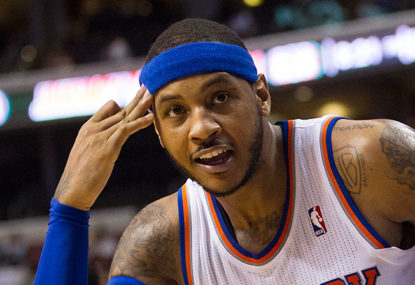Embiid indeed: MVP’s sublime return sets 76ers up for deep NBA playoff run in the paper-thin East
The only realistic threat to Boston’s chances of strolling through the Eastern Conference is a team that could still end up in the play-in…

The theory behind tanking sounds good, at least if you disregard the ethical questions about the value of always trying your best and the fraud involved with charging full ticket prices for fans to see teams try to fail.
Conventional wisdom states that the worst fate for an NBA franchise is to be stuck in 41-41 purgatory, neither contending for the championship nor earning a lottery pick.
Supposedly, the best strategy for a middle of the pack team is to raze the roster, plummet to the bottom of the standings and take advantage of a lottery pick to recharge the team’s fortune.
When put this way, tanking sounds rational.
The problem is that it does not work.
I wrote about tanking last season but it is worth discussing again because some teams are so blatantly tanking that multiple websites are tracking the tanking ‘standings’, with the leaders being the teams with the most losses.
The Philadelphia 76ers made the playoffs in 2011 and 2012 with Doug Collins as the coach. In 2012, they pushed the Boston Celtics to seven games in the second round. Then, the 76ers traded for Andrew Bynum, who was never healthy enough to be the franchise centre that the 76ers hoped that he would be.
The 76ers missed the 2013 playoffs by four games and Collins resigned.
The cupboard was not bare and management could have built the roster patiently. Instead, the 76ers fielded a team so comically inept that they made the Washington Generals look like Bill Russell’s Boston Celtics. The 76ers went 19-63 in 2013-14 and then got even more serious about tanking, dropping their first 16 games of the 2014-15 campaign.
They are currently 14-49, the second worst mark in the league behind only the 12-49 New York Knicks who expected to be good, played poorly and then went into full tank mode.
In the April 2014 issue of The Atlantic, Derek Thompson declared, “Nearly 30 years of data tell a crystal-clear story: a truly awful team has never once metamorphosed into a championship squad through the draft.”
Not once! Tanking does not work most of the time or some of the time or if everything falls into place just right. Tanking does not work, period.
Philadelphia fans who think that they see a light at the end of the tunnel of all of this losing will likely find out that the light is from a train heading straight toward them.
Hoping to obtain one superstar who will singlehandedly turn around a franchise is not a strategy but a roll of the dice that generally comes up snake-eyes. If a team does not have a winning culture in place from the top of the organisation down, then even if that team lands a superstar it will not have the right infrastructure in place to maximise his talents and surround him with the help that he needs to win a championship.
A championship team takes care of business the right way, on and off of the court. There are no shortcuts to greatness. It is important to hire a General Manager who understands the sport and whose personality is the right mix of boldness and patience. Such a GM must bring a first rate coach into the fold, one who can teach young players while also keeping the veterans motivated if the team has no chance to win a title.
NBA teams that turn around and stay turned around have a philosophy of player acquisition that goes well beyond hoping that the number one pick falls into their laps.
The teams that are losing on purpose are disgraceful. They are following a strategy that is not only unethical but also flawed and they deserve to lose now and in the future, though one does feel sorry for the players on such teams who are actually trying their best but have been dealt an unplayable hand.
Putting together a roster that has no chance to win breeds bad attitudes and habits within an organization.
Tanking is not only self-destructive for the teams that do it but it also makes a mockery of the sport.